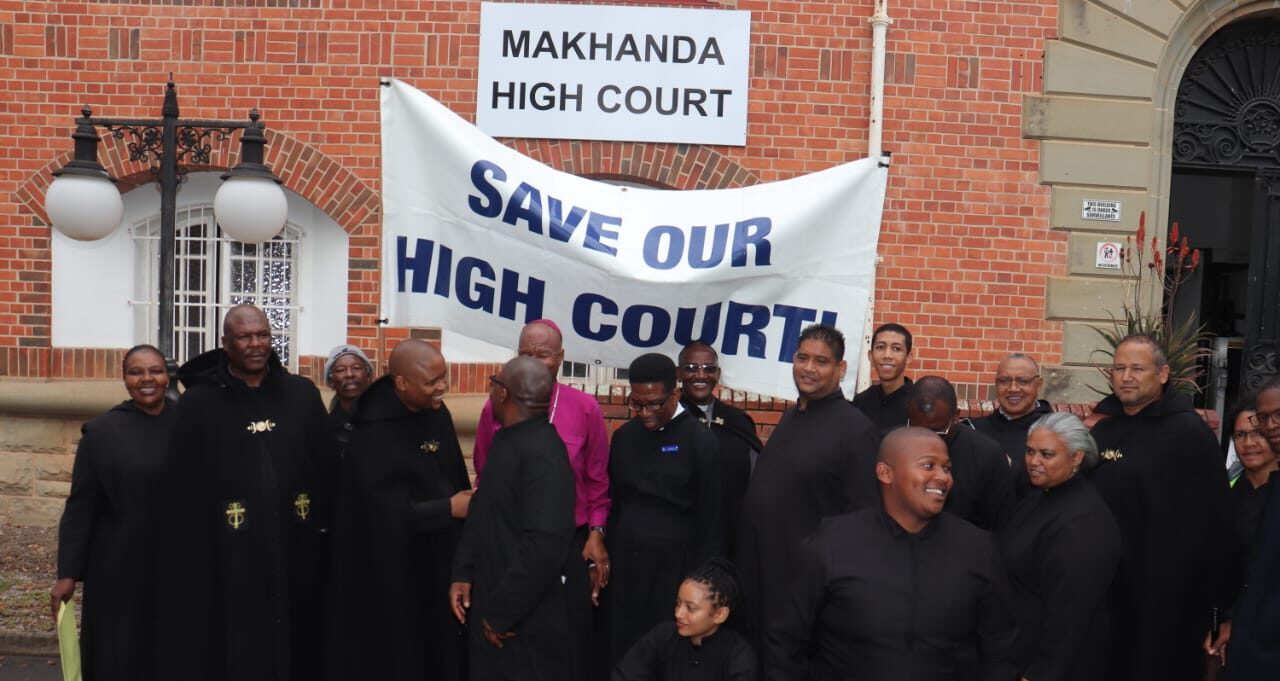By Anna Majavu
The Makhanda High Court Action Committee (MHCAC) has vowed to intensify its campaign to keep the provincial seat of the High Court in Makhanda following last week’s final recommendation that the court must be moved to Bhisho.
The pointless move would bring access to justice closer for residents of some parts of Eastern Cape, “but certainly much further away for others”, said the MHCAC.
Research by the MHCAC released earlier this year found that if the move went ahead, one-third of Makhanda’s businesses would lose so many customers that they would have to shut down. Makhanda would become a “ghost town” where unemployment would skyrocket from 38.3% to above 50%, significantly higher than the national average of 33.6%. The research also found that more than 5000 people associated with different aspects of running and supplying the court would lose their jobs.
A Grahamstown Feeding Association (GFA) survey previously found that 9000 households, or 51 750 people in Makhanda, survive on less than one meal a day, and that if the provincial seat of the High Court was moved, the resulting job losses would cause “unmitigated devastation” to the town’s food security.
The MHCAC said on 3 August that the final recommendation from the committee was premature and that it was “deeply disappointed” with the decision. Minister of Justice and Correctional Services, Ronald Lamola, had promised in a 13 July meeting at the Makhanda Town Hall that he would allow time for further arguments against the move before making a final decision. Instead, the committee he set up to “rationalise” divisions of the High Court, chaired by former Deputy Chief Justice Dikgang Moseneke, released its final recommendations on 28 July, before further arguments were filed.
“We encourage each and every member of Makhanda and the greater community to have their voice heard to ensure our city does not lose further job security, economic stability, and a key pillar of our society in the legal fraternity, both in the business sector as well as Rhodes University and the Courts itself,” said the MHCAC.
The MHCAC has the support of the legal fraternity of Makhanda, Rhodes University, the Democratic Alliance (DA), the Makana Residents Association (MRA), the Makana Legends religious leaders, the Makana Business Forum, the Makana Citizens’ Front, the Unemployed Peoples’ Movement, the Society of Advocates for the Eastern Cape (Gqeberha and Makhanda), the Isikhalo Womxn’s Movement against Gender-Based Violence and Femicide, and the Grahamstown Feeding Association.
The Makana Residents Association (MRA) said it would continue to oppose the move. MRA interim chairperson Philip Machanick said moving the High Court away from public interest law centres and the Rhodes University law clinic, to a place where none of these services existed, would not make access to the court easier for impoverished people.
“I have never known anyone to say they could not access the High Court because the taxi fare was too high. There is a lot more to it than that – there is access to public service-oriented lawyers, University law schools, legal clinics, organisations like the Legal Resources Centre. Without those, the High Court is less accessible” said Machanick.
Machanick added that with Makana Municipality being “so dysfunctional”, Makhanda would be completely unable to weather the loss of the High Court, and its removal would have a disproportionately negative effect on the town.
The Isikhalo Womxn’s Movement against Gender-Based Violence and Femicide, which has members in Makhanda, Bathurst, Kariega, and Gqeberha, also opposed the decision saying it would put justice further out of the reach for rape victims in all the Eastern Cape cities and towns that are closer to Makhanda than to Bhisho. “We are not saying there are no victims in Bhisho but what about all the rape victims in this huge part of the Eastern Cape? We also oppose all the jobs that will be lost, particularly given the poor state of the economy in Makhanda,” said the movement’s co-director, Anelisa Bentele.
Before the move can take place, Parliament will need to amend the Superior Courts Act which states that the Eastern Cape High Court division’s main seat is in Makhanda. The DA said it would oppose the decision in Parliament. However, with an ANC majority in Parliament, it is far from clear that the DA would be successful.
“Makhanda cannot afford to lose a single employer. The state of the municipality is incredibly fragile, and the local economy is in a state of decline. Moving the seat of the High Court to Bhisho may be the final nail in the coffin of the municipality”, said DA provincial leader Andrew Whitfield.
Rhodes University Vice-Chancellor Professor Sizwe Mabizela, one of the MHCAC’s leaders, has previously said that if the seat of the High Court is moved, “the municipality, already in a parlous state, would lose millions in rates revenue. The city would become less attractive and less liveable for our staff and students. This would place the viability and sustainability of the town as an education centre at a great, and potentially irreversible, risk. An increase in poverty, hunger, and hopelessness would be the inevitable consequence for everyone” Mabizela said.
This week, the MHCAC said if the move was not stopped, “the Makhanda High Court division will only have access to 8% of the entire Eastern Cape Province, (the majority of this remaining area is a rural area). The Master’s Office, the Director of Public Prosecutions, and any other Judicial Departments linked to the Court will be moved. Another result of this move would be the closure of the East London Circuit Court as those practitioners will have to practice in Bhisho”.


